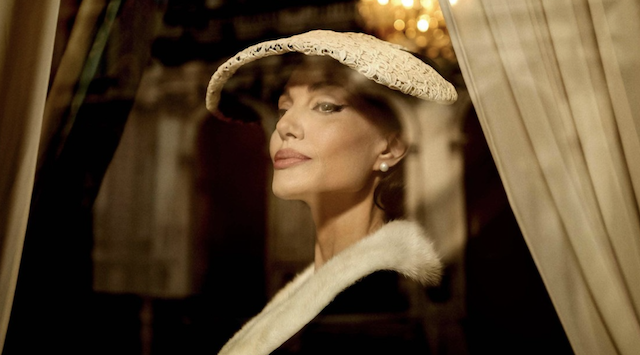
@Courtesy of Netflix
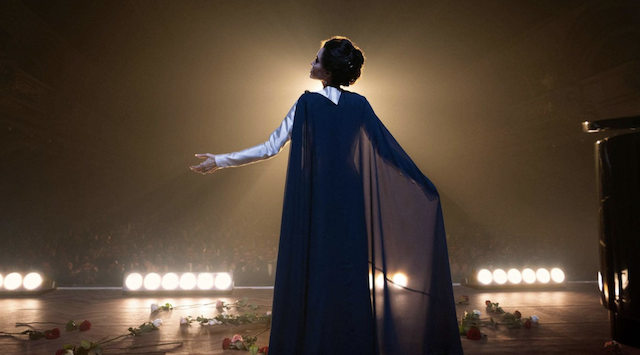
Q & A with Actress Angelina Jolie & director Pablo Larraín
Q: When did your love for opera start?
Pablo Larraín: My mother would start taking me to the opera house in Santiago when I was eight. I went to the opera all my adolescence, I still go to the opera with her. And when we were going back home, she would take a seat and play Maria Callas.I grew up with the idea of this wonderful voice with such an emotional spirit. 40 years later I had the chance to make this movie with these wonderful people, these incredible actors and performers. But Maria is a movie about not only her music, her life, but also about things that I don’t know about her, her mystery. I read nine biographies, I saw all the documentaries, every interview, we made this movie and still I have no idea who she was.
Q: You refer to Jackie, Spencer and Maria almost like an unofficial trilogy about women who made really significant contributions to the 20th century. You depict them in a troubled chapter of their lives. Is Maria a little different for you because you’re an opera loving artist?
Pablo Larraín: Of course. I wonder why there’s so few movies about opera, given that there’s so much in common. I had the chance to write an opera once, and it was very similar to what I do when I’m on film. There are obvious differences, but they’re so similar in a number of things. That kept me very curious. Maybe the biggest challenge has been showing the perception of her mind, because we don’t experience reality the way cinema shows. For example we look at our phone and see the reflection of ourselves in the glass, or when we walk on the street that reminds us of something, it triggers a memory.
Our perception of reality is very beautiful and random, and is very emotional. That was the idea of this film, that she’s walking on the street, sees something and then she’s inside of Madame Butterfly. And then she goes home, plays a record, and remembers when she played that and sang that on that day, with that dress. This perception of reality through music was possible because music and opera is completely endless.
Opera is often restrained to educated people, sophisticated, tickets are often expensive: Maria Callas wanted to put the opera back into more people, making the opera back into the masses. We wanted to do this movie as well because of that, to try to show people that opera is more accessible, beautiful, can be simple, can be very moving.
Q: What was your impression of opera and Maria Callas before you came to this project and what attracted you to the life of Maria?
Angelina Jolie: I’m so grateful for the opportunity to do this film because it helped me into the world of opera that I did not grow up with and wish I had. I’m very happy that my children are now growing up, even though their introduction was a bit like their mother in the house. As I’ve grown older, I realize that I can feel opera differently. I really understand, I’m very affected by music when I listen to it, as we all are.
That feeling that comes so full through as you get older and you go through different things in life, it settles with you even more. I knew of her, I knew her voice, but I didn’t know her and in many ways don’t know her, but I was so taken by this woman, this little girl whose mother was very unkind to her, who went to the conservatory when she was too young to even go and they lied about her age, who couldn’t see very well and wear big glasses. She covered all these things and pushed herself to try to be the best because she felt if she wasn’t loved, she didn’t have a place in this world. Music and composers in many ways were her family, the audience was her family.
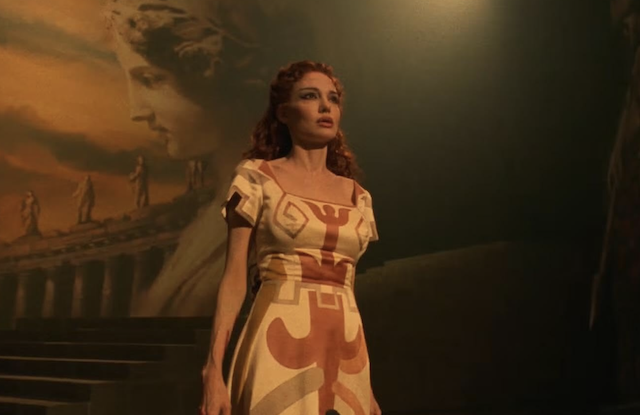
@Courtesy of Netflix
Q: Tell us a little bit about the training, how you got into that, where did you start, and how much of your voice is what we hear?
Angelina Jolie: Only Pablo knows. I still can’t believe I was mixed with her. It was about seven months of training before the film started. We started with breathing and posture, then just making sounds and beginning to open up and pitch. And Italian classes for a while. Then a wonderful opera singer came in, Laurie, and we started to sing opera. It took me a while, all through production I was still taking classes every night, every lunch break. I have so much respect for a real opera singer because It is such a physical feat. It’s so technical, but the music is so beautiful.
Q: Was there a particular aria that you loved performing the most or that challenged you the most?
Angelina Jolie: Yes, Anna Bolena.
Pablo Larraín: I’ll tell you how it’s done. Angelina had to go through a very long and detailed process where it’s not just learning the music, the words and the accent but just being able to follow the structure of the melody. On the set she would have an earpiece with Maria and the orchestra, nothing else would sound for the crew, the rest of the cast and the extras. Sometimes it was 50 people, sometimes 500 people. She was alone singing to all of us.
And we would record that, capture every sound, not just her voice, the breathing, every sound that comes out of a human with a number of microphones, and then go to a mixing stage, nothing super sophisticated, just a regular mixing system where you mix and you bring in, obviously, Maria Callas, voice and a new recording of the orchestration. And then you create a mix where most of it is Maria Callas because you don’t want to make a movie about Maria Callas without Maria Callas voice, right?
But you want to make it believable in a way that is truthful for everybody. When she’s singing in the rehearsal room, that is 60 % Angie. That was the process to get there, it was not only the best way for her to get to the character and to really understand, but it was the only way to do it. That was the challenge, and she did it. I was there.
Q: What was it like to be not only singing in her voice, but also wearing the clothes that she would have wanted to wear?
Angelina Jolie: For me, the one I loved, the one I needed to find first, was the woman in the robe with the glasses on. That robe was handmade, to me it was such a key because it was so earthy, I just felt it was a real woman’s robe, it spoke to me. The costume designer Massimo Cantini Parrini actually taught me how to dress, all these things are about how somebody would be raised at that time in Europe or New York. I loved it. The costumes would transform you into this third character, me and Maria playing Tosca for example. Those costumes were extraordinary and so fun to wear, so dramatic and just beautiful.
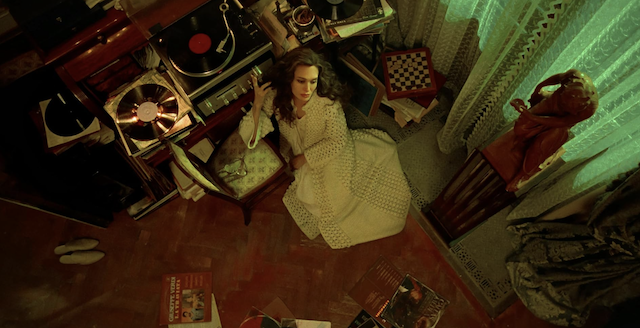
@Courtesy of Netflix
Q: How did you sort of chart the key arias you wanted to use? What were some of those selections influenced by?
Pablo Larraín: There are a number of reasons why the music is there. One of them is that I personally had to love it. I was trying to be as fair as possible, we built a musical map, the intention was to have certain pieces that would match the circumstances that are going through the character in that opera. The intention was to use subtitles so it would be more visible for the audience, but when we did that in the editing room it would just kill the movie, it was just so distracting because it became rational. We didn’t need to subtitle those scenes because it is transmitted anyway. In every opera there’s logic, there’s a story, there’s an argument, tragic melodramas, but there’s nothing really rational. She says: “My life is opera”, so we stick to that.
Q: What about the experience of filming in the Opera House La Scala in Milan? What was it like to be in that space?
Angelina Jolie: Well, we had four hours. It was a big deal that we were allowed to have those hours, it was something we all were working towards. It was like a real performance at La Scala. We were like: two months away, one month away, one week away, are we ready for La Scala? I couldn’t believe I was there, I didn’t even feel comfortable in the dressing rooms, I was very shy on that day, what got me through was feeling that somehow this was for her and I had better do my best. I was a bit shaky, but it was so beautiful, so special.
Q : What did you find most challenging about this role and why?
Angelina Jolie: Of course the singing was very challenging, But sit with Maria and find Maria, emotionally connect to her, do our best not to do a caricature of her and her life. The real woman is more interesting than just this idea or this icon. So finding her was the most challenging, the most important aspect for all of us.
Q: Do you hope that Maria will speak to the non-classical music fans after watching ? Is that why you made this movie?
Pablo Larraín: I honestly don’t think it’s fair what cinema has done to the opera in terms of the amount of things that it can do. Such a powerful form of art really deserves more attention from everyone. Cinema, given that it’s more popular or accessible, if there’s fifty people that get more interested in this art form, then we have succeeded. The first question that I got was: why Angelina? I believe that opera and the greatest art forms ever existed are done by people that could let you in and let you out when they want. Maria Callas was someone that chose really well, as a performer and as a human, when to be mysterious and to be more accessible.
That makes you wonder what you are watching, as an audience you’re affected by it, you’re curious all the time. And Angelina can do that. She chooses when to let you in because of her performance and then when she’s like: get out of here! I love that because that keeps you active as an audience, and that is opera as well. That is a form of art and deserves more attention from us. You are invited to be part of a process that’s not entirely digested and by the people that’s doing it. So you must be there, must be present.
Angelina Jolie: I’m so happy that opera and classical music is now a regular part of my life. It’s transformative, it’s aspirational, there’s something about the complexity, there’s a lot of art forms that try to make it as simple as possible for you to digest. There is something so important about the art forms that are complex, it has a different effect on you, it does what I believe great art should do and It’s important.
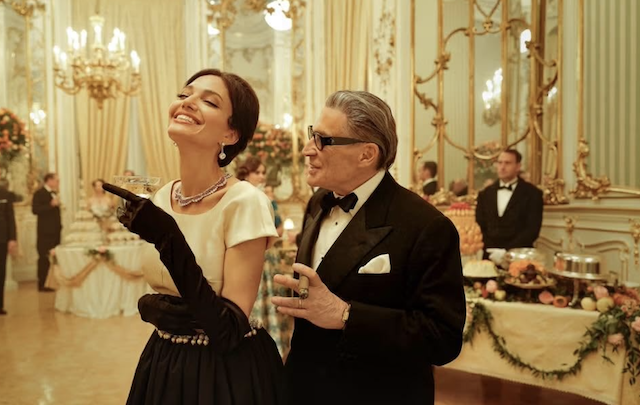
@Courtesy of Netflix
If you like the Q&A, share your thoughts below.
Check out more of Adriano’s articles.
Here’s the trailer of Maria:

